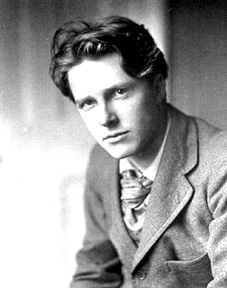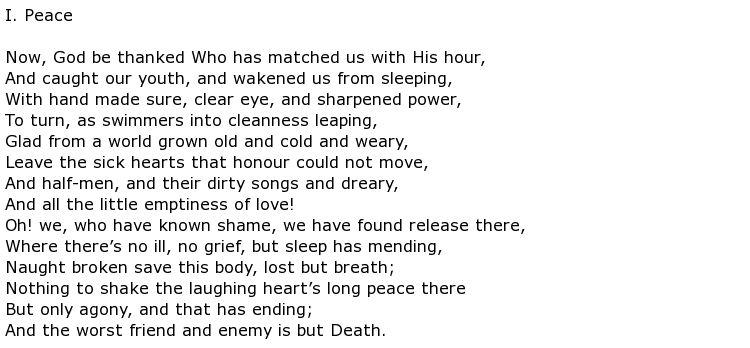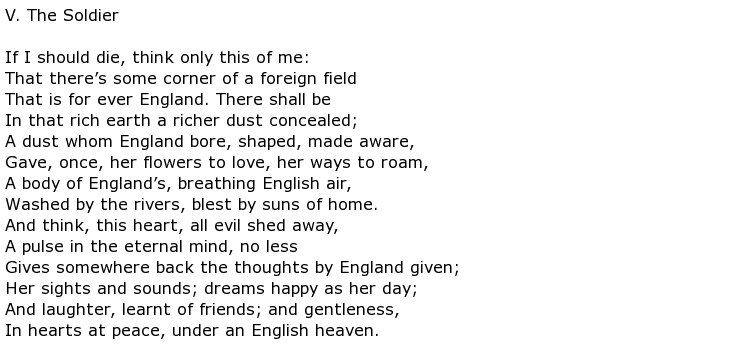 Some of the most iconic 20th century poets were young men killed in the First World War. Whilst Rupert Brooke was not killed in action, he was quickly celebrated as the fallen ‘golden warrior’, a vision of patriotic beauty and talent. Born in 1887 to a respectable, academic family, Rupert received a good education from two independent schools in Rugby. Before attending university Brooke travelled around Europe and wrote the thesis that won a scholarship to attend King’s College in Cambridge in 1906.
Some of the most iconic 20th century poets were young men killed in the First World War. Whilst Rupert Brooke was not killed in action, he was quickly celebrated as the fallen ‘golden warrior’, a vision of patriotic beauty and talent. Born in 1887 to a respectable, academic family, Rupert received a good education from two independent schools in Rugby. Before attending university Brooke travelled around Europe and wrote the thesis that won a scholarship to attend King’s College in Cambridge in 1906.
Brooke was a handsome, charismatic student and subsequently became well known and popular in the ‘Bloomsbury Group’ of writers and publishers. Rupert Brooke befriended the likes of E.M Forster and Virginia Woolf, who once boasted that she had gone skinny dipping with Brooke. His first collection of poems was published in 1911, he later celebrated his move to Grantchester with the poem ‘The Old Vicarage, Grantchester’ (1912). In the two years before the outbreak of the war Brooke travelled to North America, New Zealand and the Pacific islands. He wrote travel pieces for the Westminster Gazette to supplement his income.
In the break out of the First World War Brooke was assigned to the Royal Naval Volunteer Reserve in 1914 where he became encompassed with the politics of warfare and poetry. Unlike other famous war poets Brooke experienced little action first hand, the most notable occasion being the Siege of Antwerp in October 1914. His experience, however, fuelled his passion to write and he produced 5 patriotic sonnets about warfare. The first sonnet ‘I Peace’ details the young man’s call to war, and how he is released from daily grievances like illness and grief to embrace war with no worry of the consequences, the worst to fear is the:

War was Brooke’s way to break his ties with his past and embrace a new, patriotic identity; ‘I.Peace’ is the start of his personal journey to a new self:

Critics would argue that the sonnets present a loyal and almost innocent view of warfare, it is theorized that had Brooke survived the war his poetry may have had a different voice, unlike the passionate, patriotic voice the five sonnets present.

The last sonnet ‘V.The Soldier’ ties in the with themes of the first sonnet ‘Peace’, expressing the relief of death but also the great spirit of English patriotism. The poem details imagery of fresh green, Elysian like fields, reminding the reader that England is forever close by in spirit and thought. The poem is ironically prophetic; Brooke died abroad in 1915 near the island of Scyros from blood poisoning. Rather than dying valiantly in battle, his death was peaceful and his friends quickly spread the myth of him dying a heroic death. The country needed a figure to celebrate, and the boyishly handsome, talented war poet was the perfect balm of comfort to a catastrophic war effort, as the last line so eloquently describes:

Brooke was buried in an olive grove on the island of Skyros, a location his close friend had chosen.

